Mao Zedong
Mao Zedong or Mao Tse-tung (Chinese 毛澤東 / 毛泽东, pinyin Máo Zédōng, W.-G. Mao Tsê-tung, IPA transcription mau̯ ʦɤtʊŋ, ![]() ; * December 26, 1893 in Shaoshan; † September 9, 1976 in Beijing) was a Chinese revolutionary, politician, and President of the People's Republic of China.
; * December 26, 1893 in Shaoshan; † September 9, 1976 in Beijing) was a Chinese revolutionary, politician, and President of the People's Republic of China.
Mao was among the co-founders of the Chinese Communist Party in 1921, which he dominated from 1935. He led the Communists in the Chinese Civil War against Chiang Kai-shek and consolidated his power on the Long March. He became chairman of the Central Committee of the Chinese Communist Party in 1943 and proclaimed the People's Republic of China in 1949. Mao helped launch China's industrialization programs. He promulgated the first constitution of the People's Republic of China in 1954 and became its first president.
Mao sent the troops of the People's Liberation Army to help North Korea in the Korean War. At the same time, to consolidate Communist Party control, he launched the Chinese Land Reform, the Campaign to Suppress Counter-Revolutionaries, the Three Anti and Five Anti Movements, the Sufan Movement, and the Anti-Right Movement. These movements led to the deaths of millions of Chinese and, in particular, made China a de facto one-party state. In 1958, Mao launched the Great Leap Forward campaign, which attempted to rapidly transform China into a powerful industrialized country, but ultimately led to the deaths of 15-55 million people in the Great Chinese Famine. After Mao partially left the center of power in 1962, he launched the Socialist Education Campaign in 1963. To keep himself in power, he began the Cultural Revolution in 1966. As a result, countless intellectuals and political opponents were murdered by the Red Guards and cultural treasures were destroyed. Mao is blamed for a total of up to 40-80 million deaths due to preventable famines, punitive actions, and political purges.
Known as the "Mao Bible," Words of Chairman Mao Zedong, a compilation of quotations and short essays by Mao, was printed over a billion times worldwide. His socio-political approaches were largely reversed by his successors (most notably Deng Xiaoping); however, his portrait continues to hang on the Gate of Heavenly Peace. During his time, China experienced constant power struggles, notably the Korean War, the Sino-Soviet discord, Nixon's visit to China, and the rise of the Khmer Rouge.
Childhood and schooling
Mao Zedong was born into a wealthy peasant family on December 26, 1893, in a village near Shaoshan in central China's Hunan province. His father Mao Yichang (毛贻昌, 1870-1920) considered himself the 20th generation of the Mao clan and traced his lineage to the army leader Mao Taihua, who fought against the Mongols until 1368 and settled in the region of present-day Xiangtan after the Ming Dynasty was established. Mao's father had only two years of schooling and was hard and industrious. He managed to get out of the debts his father had left him. With the money he had saved while serving in the army, he bought between 15 and 20 mu of land, which he farmed with the help of agricultural laborers. Later, he became a wholesaler, buying up rice in Shaoshan despite hunger and reselling it to the big cities. Mao's mother Wen Qimei (文素勤, 1867-1919) was from a neighboring village of Shaoshan. She had married Mao's father when he was 15 years old. Of her seven children, only three sons survived childhood. She was very religious and her folk Buddhism influenced Mao Zedong for his entire life. By local standards, the Maos were a prosperous farming family in their time.
Father Mao, who wanted to make his son a learned man and had given him the name Zedong (benefactor of the East), sent him to a private Confucian school in Shaoshan. Mao memorized the material there, but the ethical and moral concepts remained foreign to him. The China of his childhood was in deep crisis. Mao's grandfather had fought in the Taiping Rebellion, considered the most horrific war of the 19th century. The Hundred Days Reform had failed, and the Boxer Rebellion had led to even greater concessions to foreign powers. The population was impoverished because the traditional manufactories could not hold their own against the factory goods from the foreign leaseholds. During the self-strengthening movement, however, the beginnings of a modern educational system and a modern army had emerged. The numerous uprisings and reforms had also created an awareness among the common people that the Qing dynasty would sooner or later fall; in the traditional thinking of many Chinese, the imperial house had forfeited the mandate of heaven. Mao experienced firsthand the effects of the Ping Liu Li Rebellion and the insecurity spread by the activities of secret societies such as the Gelaohui. This and his father's despotism made Mao a rebellious child.
At the age of 13, Mao left school because of the teacher's violence. Since civil service examinations had been abolished and education no longer meant automatic entry into the imperial bureaucracy, his father hoped Mao would help out in his father's business. Against his father's wishes, however, Mao mainly engaged in reading, such as the works of the influential reformer Zheng Guanying. At the age of 16, Mao began attending a school that taught modern subjects with his cousin, who was 9 years older. However, he only stayed in this school for one year because he suffered from the hatred and arrogance of his classmates: he was ostracized because of his peasant background and the dialect of Xiang language spoken in his home village. At the age of fourteen, Mao was married to eighteen-year-old Luo Yigu, whose clan was connected to the Mao family through distant kinship ties. Mao rejected this marriage and hid with a friend in Shaoshan; Luo Yigu died as early as 1910.
In early 1911, Mao went to Changsha, 70 km away - then a transshipment point for goods and news from all over the world - to attend a new school. There, a revolt against the Qing dynasty was already in the air, and Mao was among those who had their braids cut off as a sign of rebellion. After news of the successful Wuchang uprising reached Changsha, Mao's school was closed. The province declared itself independent, and Mao joined the Hunan Army, though without serving a tour of duty of a military nature. Mao did, however, see the bodies of the leaders of the local uprising, Jiao Defeng and Chen Zuoxin - his first exposure to power politics. He left the army again and tried various schools until he was accepted at the Hunan Provincial Teacher Training College in the spring of 1913. There he was diligent only in the subjects that interested him, but nevertheless the teachers respected him. In 1917, he was named the best student of the school. He founded an association of Xiangtan students and became the chairman of the students' association. In this capacity, he revived the night school for workers. In November 1917, he organized volunteers to defend the school from marauding soldiers with the help of the police. In April 1918 he co-founded the New People's Study Society, in which He Shuheng also participated. The aim of this association was to renew China and the whole world. Mao Zedong's first writings date from this period. They show Mao's admiration for Shang Yang, the theories of vitalism and the power of human will, and also for the successful provincial governor Zeng Guofan. These were very common views among those Chinese who wanted to save their country from Western colonization efforts at the time. When Mao graduated from school, he had great ambitions but was disoriented. While at school, he had developed a friendship with the teacher Yang Changji, who greatly influenced Mao's viewpoints and drew his attention to radical positions such as those of Miyazaki Tōten. He was also influenced by fellow students such as Cai Hesen, one of the leaders of the ChineseCommunistParty in its early days. Unlike other politicians of his time, Mao did not attend any of the newly established universities. He acquired his positions through self-study in the Changsha City Library. He remained more rooted in cultural traditions than other, later communist revolutionaries.
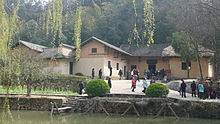
Birthplace of Mao Zedong in Shaoshan, today a tourist attraction especially for Chinese.
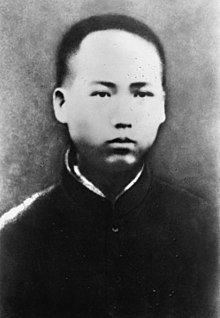
Mao Zedong in 1913
Power
Long march
At the beginning of November 1934, the Communists with almost 90,000 men left for the west with an unknown destination. The mood among the fighters was bad; the Red Army resembled a train of defeated men. Mao took advantage of the mood and the long rides to draw to his side from Bo Gu's circle of supporters, first Luo Fu, and later Wang Jiaxiang and Zhou Enlai. He had the advantage of being able to disclaim any blame for the loss of the Jiangxi Soviet. His name thus stood for a new beginning. At the first important vote on the Long March, namely that on the destination of the evacuation, he prevailed and the mountainous terrain of Guangxi, Guizhou and Sichuan was thus chosen as the first place of refuge.
In January 1935, the Red Army paused for marching in the town of Zunyi and the party leadership met for a discussion at the three-day Zunyi Conference. Bo Gu and Zhou Enlai, who had been in charge of the Communist Party military since 1932, had to report. Luo Fu and after him Mao Zedong severely attacked Bo and Otto Braun in their speeches, blaming their mistakes for the loss of the Soviet. At the end of this conference, Bo Gu had no supporters left except Kai Feng and Otto Braun, while Mao was reappointed as a member of the Politburo Standing Committee. In February, Bo was forced to relinquish his post as general secretary of the party to Luo Fu, and in March Mao was elected political commissar of the newly created Military Council. After this conference, the trio of Luo, Wang, and Mao dominated the party. Mao had thus regained the influence and positions he had lost in 1932.
In June 1935, Mao's First Front Army met Zhang Guotao's Fourth Front Army. Zhang's troops were stronger and better equipped, while the Red Army had virtually lost its combat readiness. The political leadership of the First Front Army, on the other hand, was legitimized by Moscow. Zhang and Mao, moreover, harbored a personal dislike for each other. The inevitable power struggle between Zhang and Mao ensued; Mao risked a renewed division of the Communist camp. He wanted to move north to jointly establish a Soviet and extend it to the border with the Soviet Union. He also wanted to take up the fight against the Japanese invasion in order to legitimize his claim to leadership over Zhang Guotao by arguing the struggle for national sovereignty.
On October 22, 1935, Mao declared the Long March in northern Shaanxi Province over. Here Mao's army was united with the troops of Liu Zhidan's Bao'an Soviet. The Long March had enabled Mao to seize power over the Party, but the Red Army had dwindled to 5000 soldiers. The Communist Party initially chose Wayaobao as its headquarters. Zhang Guotao and Zhu De did not arrive in northern Shaanxi until November 1936, eliminating them as contenders for power in the CP.
Rebuilding the KP in Shaanxi
In the months after arriving in northern Shaanxi, Mao reorganized the Red Army, which now had about 10,000 fighters. The strategy of portraying the Red Army as an anti-Japanese army began to take effect. The December 9 Movement of 1935, which had demanded that the Nanjing government take stronger action against Japanese aggression, led to an increased influx of people into the CP. This approach by Mao Zedong was in line with Moscow, although contact there was temporarily severed: Stalin wanted a stable China as a hedge for the Soviet Union against Japan. Therefore he instructed the Communist Party to strive for a united front with the Kuomintang. Mao also sought consensus with his erstwhile opponents in this regard. In December 1935, the party decided that the national bourgeoisie should fight with the workers and peasants of China against the Japanese.
The Politburo meeting of December 8, 1935, accordingly formulated a call to the Kuomintang for a truce and joint struggle against Japan. Chiang Kai-shek, however, prompted further attacks on the Communists. The most important question now became to win at least a part of the Kuomintang for a ceasefire. An opportunity to do so presented itself in the person of Zhang Xueliang, who had retreated with his troops from Manchuria to Shaanxi's provincial capital of Xi'an ahead of the Japanese, and who was also looking for allies. As early as November, Mao had offered a truce to a commander of Zhang's troops. In April 1936, direct negotiations ensued, resulting in a truce and even arms deliveries from Zhang to the CP. Chiang sought out Zhang for a face-to-face talk in Xi'an for this reason, parallel to this talk over ten thousand students demonstrated against Chiang's lax Japan policy. This conversation resulted in Chiang's arrest. Mao rejoiced - on December 15 the entire CP leadership sent a letter to the Nanjing government demanding that Chiang be tried in a people's court. Stalin, however, put pressure on Chiang to be released. Shortly before these events, Germany and Japan had signed the Anti-Comintern Pact. Stalin now wanted a stable China more than before and Chiang was the strongest player. Therefore, Stalin urged Mao to resolve the conflict peacefully. Relations between Stalin and Mao came under great pressure, for it was obvious that Chiang and his numerous German advisors were working first to destroy the Communist Party, only then to resist Japan. Ultimately, however, the Chinese Communist Party depended financially on the Soviet Union. On February 10, 1937, the CP again sent a message to the 3rd Plenum of the Kuomintang formulating the basis for cooperation against Japan.
Pressure from Moscow resulted in an understanding between the Kuomintang and CP to cooperate from March to May 1937. In July 1937, the Second United Front was formally adopted. The Red Army was placed under the supreme command of the Nanjing government and was now the 8th March Army of the National Revolutionary Army commanded by Zhu De. Mao acknowledged the leading role of the Kuomintang; however, both sides were already planning the internal Chinese struggle that would continue after the war against Japan ended. Mao also asserted on August 22, 1937, that the Red Army would continue to be a partisan army with guerrilla tactics. He argued that the loss of the army would also be the end of the Communist Party and its officials personally. From then on, the Red Army carried out actions in Japanese-occupied territory, and social changes also continued in the territories controlled by the CP.
During the Great Terror in the Soviet Union, Mao began to seek other allies. For example, he contacted the Labour Party and welcomed Evans Carlson, the confidant of the American President Roosevelt. Carlson gave a much more positive account of Mao than of Chiang: he described him as a dreamer and a genius, and as someone with a gift for getting to the heart of a problem. He considered the CP's policies at the time to be liberal democratic and emphasized that Mao planned a coalition government for China. In parallel, he resolved the power struggle with his opponent Wang Ming, Stalin's confidant and China's representative in the Comintern. Wang had repeatedly sown Stalin's doubts about Mao's loyalty; Stalin demanded that Wang report any Trotskyist deviation. Since Zhang Guotao, Kang Sheng, Bo Gu and Zhou Enlai were also on Wang Ming's line, not to mention working closely with the Kuomintang, Mao dispatched Ren Bishi, his own representative, to Moscow. When a little later the Comintern stressed the importance of supporting Mao Zedong as leader of the Communist Party, the leadership problem was solved. Thus Mao's Chinese Communism also prevailed over the Communists trained in the Soviet Union. The cult of leadership and Stalinization of the Party began; Mao now began to actively promote this cult himself. The reports of Edgar Snow, Agnes Smedley, and other Western journalists led to some spread of the cult of Mao abroad.
In June 1936, because of an attack by the Kuomintang, the CP lost its Wayaobao headquarters and had to flee to Bao'an, a semi-deserted place with a population of about 400. In January 1937, the CPC Central Committee moved from the earthen caves of Bao'an to Yan'an. He Zizhen had shortly before given birth to her fifth child with Li Min. Life in Yan'an, where many young people who wanted to commit themselves to communism had also come, also brought with it many temptations in gender relations. The marriages of many Party officials were divorced. He Zizhen also left Mao after affairs with the American journalist Agnes Smedley and the Chinese actress Wu Lili.
In September 1938, Mao began an affair with film actress Lan Ping. He married her on November 19, 1939, having previously chosen the name Jiang Qing for her. Jiang Qing was the former mistress of Kang Sheng, who would later become head of China's intelligence services and, among other things, steered the campaign against right-wing dissenters. They later became part of the Gang of Four. Their daughter Li Na was born on August 3, 1940.
Victory over the Kuomintang, beginning of the Mao cult
See also: Correction movement
In July 1937, Mao began to study Marxist and Bolshevik philosophy intensively and to give lectures at the newly founded Anti-Japanese Military Political University. He also published numerous reflections on political and military issues and applied the ideology of Marxism to Chinese culture and reality. This Sinicization of Marxism was tolerated by Stalin, who knew that in order to establish a cult of leadership in China, Mao would also have to demonstrate intellectual achievements.
In order to broaden popular support and out of concern for the cohesion of the Communist Party, Mao, together with Chen Boda, developed the concept of New Democracy beginning in late 1939. It included state respect for property, promotion of Chinese entrepreneurship, encouragement of foreign investment, state control of key sectors, a multiparty system with coalition government, and democratic freedoms. However, the Communist Party claimed the leading role in this concept. To foreign visitors, Mao stated that New Democracy was a necessary intermediate step for China on the road to socialism and, ultimately, communism. It is also possible that it was developed from the beginning only as a deceptive ploy, similar to Stalin's dissolution of the Comintern during World War II. When it became apparent that the communists would win the civil war, Mao turned away from the concept again. However, it had led to a split of leftist factions within the Kuomintang led by Sun Yat-sen's widow Song Qingling.
With the establishment of liberated areas behind Japanese lines, the Communist Party's membership grew very rapidly. This meant that many new party members had had no previous contact with communism. Moreover, about two-thirds of the new members who joined were illiterate. Mao rejected purges as in the CPSU; in their place, Mao spoke of rectification movements and alignment movements. He brought Liu Shaoqi to Yan'an to look after the internal affairs of the Party and to provide further training for Party cadres. Between 1935 and 1945, 44 Party schools were established in the base area of Yan'an alone, where new members were to be trained and socialized and where ideological control was to be exercised. In addition, meetings began to be convened where self-criticism was expected and practiced by the participants. Training sessions and self-incrimination campaigns were organized. Under Kang Sheng, the first special commissions were set up.
The 1945 Yan'an Party Congress was attended by 754 delegates, by now representing 1.2 million members. At this party congress of unity - Wang Ming had by now been dismantled, Zhou Enlai no threat to Mao's claim to leadership - a new party statute was adopted, declaring Mao Zedong Thought to be the basis of the Chinese Communist Party. Mao was now the paramount leader of the Communist movement and held all power in his hands. His earlier positions, which had often earned him an outsider role, were now declared to be the central CP line, and the policies formerly followed by the majority of the CP became minority viewpoints. A committee for the purification of history was given the explicit task of adapting history to the necessities of the cult.
After the Japanese attack on Pearl Harbor, it was clear to Mao that the U.S. would have to defeat Japan and the Communists would have to conserve their forces for the ensuing war against the Kuomintang. Mao therefore welcomed the Dixie Mission, by which the US would have a team under David D. Barrett and John S. Service investigate the Communists. He was able to convey to the U.S. representatives that the CPC was independent of the CPSU and that the U.S. was the only country that could help China achieve the rapid economic growth it sought. To prevent the U.S. from giving its aid to the Kuomintang, Mao even considered renaming the Communist Party. The picture painted of the CP by the participants in the Dixie mission was quite positive. It was, however, received with skepticism by much of the American intelligence community. The American government was not fooled.
Shortly before the surrender of Japan, the Chinese Civil War flared up again. Negotiations between Mao and Chiang brought no result. U.S. Ambassador Patrick J. Hurley attempted to mediate an understanding between the CP and the Kuomintang and accompanied Mao to Chongqing on August 28, 1945. The talks were to last six weeks. Chiang Kai-shek, however, persisted in refusing to cooperate with the Communists. That same month, Chiang signed a treaty of friendship and alliance with the Kuomintang. After the surrender, the Kuomintang controlled two-thirds of Chinese territory, while the Communists held some liberated areas centered in the border areas of Shaanxi, Gansu, and Ningxia. A total of 95.5 million people lived in the communist-controlled areas. Japanese soldiers were ordered to surrender only Kuomintang soldiers; Japanese captured soldiers were used in activities against the communists. In this way, the Kuomintang was able to push the Red Army back sharply by 1947. The Yan'an base also had to be abandoned. Mao instructed the Red Army troops to engage in combat only when their victory was certain, and to use guerrilla tactics exclusively.
Despite Chiang's offensive on the Yan'an base in 1947, and despite Stalin's reluctance to supply arms and remit money-his distrust of Mao had grown and he did not want to provoke the U.S.-the People's Liberation Army grew from 1.2 to 3.5 million soldiers in one year. In the summer of 1947, the Red Army implemented Mao's plan to occupy the Dabie Mountains in central China. This destroyed all of Chiang's plans and forced him to make massive troop deployments. The influx of the People's Liberation Army and mistakes by Chiang Kai-shek led Mao to unite his forces with the troops of Liu Shaoqi and Zhu De in Xibaipo in May 1948. While Chiang's troops were increasingly disintegrating due to corruption and pursuit of personal interests by commanders, the Red Army fighters were fanatical. In January 1949 they succeeded in capturing Manchuria, and a few months later Beijing, Shanghai and Nanjing were conquered. By 1950, all of China had been taken by the Communists. On October 1, 1949, Mao Zedong proclaimed the People's Republic of China at the Gate of Heavenly Peace and was now faced with the daunting task of stabilizing the new state and its unity. He led a coalition government as chairman, with Liu Shaoqi, Zhu De and Song Qingling as his deputies.
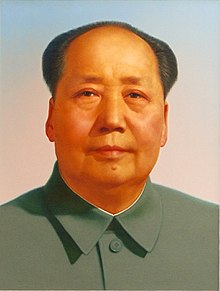
Official portrait of Mao Zedong at the Gate of Heavenly Peace
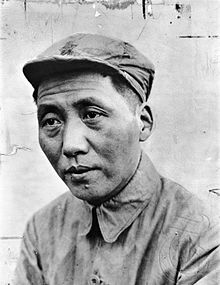
Mao Zedong shortly after the end of the Long March
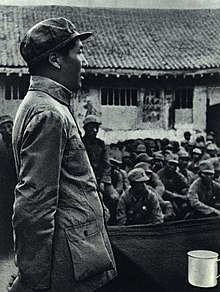
Mao teaching at the Anti-Japanese University, 1938
Questions and Answers
Q: Who was Mao Zedong?
A: Mao Zedong was a Chinese Communist leader.
Q: What was Mao Zedong most notable for?
A: Mao Zedong was most notable for resisting the Japanese invasion and unifying China.
Q: What party did Mao Zedong rule as the chairman?
A: Mao Zedong ruled China as the chairman of the Communist Party of China.
Q: When was Mao Zedong born?
A: Mao Zedong was born on December 26, 1893.
Q: When did Mao Zedong die?
A: Mao Zedong died on September 9, 1976.
Q: What is the importance of Mao Zedong in Chinese history?
A: Mao Zedong is an important figure in Chinese history for his leadership in resisting the Japanese invasion and unifying China.
Q: What are some of Mao Zedong's other contributions to China?
A: Mao Zedong's other contributions to China include the establishment of a socialist economy and the implementation of various programs to improve the country's agriculture and industrialization.
Search within the encyclopedia
.jpg)
